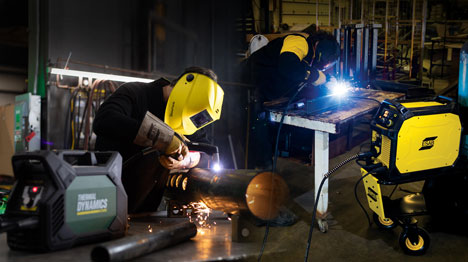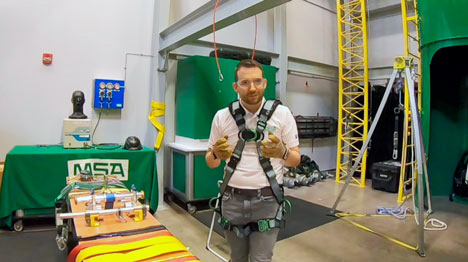The breadth of work in safety and the need to stay on the right side of OSHA have created a booming EHS job market. We share an overview of the jobs and average salaries you can expect in the U.S.
“Safety work is today recognized as an economic necessity. It is the study of the right way to do things.”
Those are the words of Robert W. Campbell, the first president of the National Safety Council, addressing the Third National Safety Council Congress & Expo in 1914—more than 100 years ago.
He could have said it yesterday. And in manufacturing, where a complex weave of laws, standards and regulations now define safe practices, it’s the job of several different types of safety workers to make sure that employees are safe and staying on the right side of compliance.
What are these varied safety jobs? What’s the career trajectory? What are the salaries?
Better MRO takes a look into salary data, analyses and research done by the American Society of Safety Professionals, the Board of Certified Safety Professionals, Deloitte, Indeed and PayScale.
More Than Just Safety Managers in Manufacturing Safety
There are several jobs across the safety teams found in manufacturing: safety coordinator, safety manager, industrial hygienist, safety director, and environmental health and safety officer.
Interestingly, most jobs in safety are, by and large, full time, according to the “2018 SH&E Industry Salary Survey” that tabulated responses for 9,978 respondents.
The survey found 92 percent of safety workers were full-time employees and their median salary was $97,000.
Base Salary Data
Source: ASSP & BCSP
And in this field, certifications matter—a lot. Just one certification can push the salary up by $10,000.
There are 12 potential safety certifications (ASP, CDGP, CET, CHMM, CHMP, CHST, CIH, CSP, OHST, SMS, STSC and STS)* and earning just one will typically drive an employee’s pay up by $20,000.
“The value of safety, health and environmental certifications continues to grow, with many laws and standards specifically citing them,” BCSP CEO Treasa M. Turnbeaugh, told EHSToday. “Many companies include certifications in their job requirements, and contracts for safety services also call for them. Earning certifications that support your specialty and heighten your expertise is the smart thing to do.”
There was a similar bump up for post-secondary degrees, plus there’s also the opportunity in most of these positions (66 percent) to receive bonus cash compensation beyond the salaries.
But safety staff work hard for that money according to a respondent to an anecdotal survey by EHSToday: “Fulfilling, exhausting, at times frustrating. Not for everyone. Good pay if you're experienced and educated. You will work for that money though, not going to be sitting back and collecting a paycheck on Easy St., you are responsible for making sure everyone goes home the way they came in.”
Safety Professional Titles and Salaries
But how do individual jobs stack up? Let’s take a look at U.S. salary averages updated by Indeed in August 2019.
Safety coordinator: This person supervises employee activities and inspects equipment for compliance, manages accident reporting, trains employees, and develops health and safety policies. Average salary: $56,873
It’s more of a newbie field, with most still early in their careers.
Source: PayScale
Safety manager: This person “has an eye for detail and an ability to show good judgment in pressured situations,” notes PayScale. Average salary: $77,332
Typically, safety managers develop safety and health policies and practices, and make sure the company complies with rules and regulations. A key part of that work involves audits and inspections. They oversee any accident or injury investigations, and then manage employee training.
Eighty percent are men, according to PayScale data.
Industrial hygienist: Industrial hygienists have a broad charge to protect the health of employees. They draft policies, run programs, and monitor exposure to environmental, biological, chemical and physical stress factors. **Average salary: $**78,662
“More than 40 percent of the OSHA compliance officers who inspect America’s workplaces are industrial hygienists,” according to the agency’s Office of Training and Education.
Safety director: As emergency preparedness often is a responsibility, PayScale notes, “effective communication is essential for safety directors.” Average salary: $83,929
The job entails helping with and monitoring projects across facilities, and then recommending improvements. Safety directors also collaborate with other department personnel in information management activities. And they manage training, inspections and performance reviews.
Environmental health and safety officer: EHS officers will craft and implement employee health and safety plans, and also review and analyze reporting data. They are the ones to implement waste and toxins management. They will also oversee audits and remediation, and provide expertise to ensure compliance. Average salary: $90,541
Experience matters here, and salaries for EHS chiefs with 19 years on the job will best a newbie’s pay by $17,000.
Source: PayScale
Want to learn more about the training and certification needed for a career in safety? Be sure to read “The Path to Becoming A Safety Professional: Certifications And Steps.”










